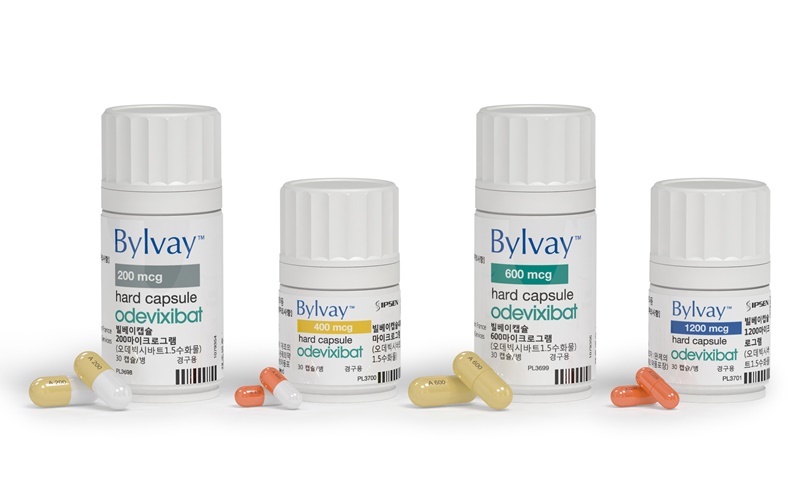- Bylvay successfully obtains reimbursement on the 2nd attempt
- by Moon, sung-ho | translator Hong, Ji Yeon | Sep 23, 2025 06:06am
As a high-cost medication for a severe and rare disease, Bylvay's reimbursement and monitoring have been categorized under government management.

PFIC is a rare genetic disorder where the accumulation of bile acids in the liver causes damage and can lead to liver failure. It is a serious condition that may require a liver transplant if not diagnosed and managed effectively early on.
A key symptom of the disease, pruritus, significantly impacts sleep and daily activities, leading to skin damage, sleep loss, irritability, and reduced attention.
Ipsen Korea has estimated that the treatment applies to approximately 50 patients, highlighting the rarity of the disease.
Due to the severity of PFIC and the innovative nature of the drug with few alternatives, Bylvay was selected as the first drug in the Concurrent Approval-Evaluation-Negotiation Pilot Program initiated by the Ministry of Health and Welfare in 2023 to accelerate the introduction of innovative new drugs.
However, the reimbursement process was not easy. Bylvay went through a 're-evaluation' at the Health Insurance Review & Assessment Service's (HIRA) Drug Reimbursement Evaluation Committee (DREC). Due to the drug's status as a treatment for a rare disease and Ipsen Korea's firm resolve, Bylvay has been included in the reimbursement list in October.
The Ministry of Health and Welfare selected Bylvay as a target for managing reimbursement of high-cost drugs. High-cost drugs are defined as 'medications that require price management and long-term efficacy verification due to their high cost and uncertain efficacy, or medications that require usage management due to their significant financial impact.' With the inclusion of Bylvay, the total number of managed treatments has increased to seven.
Accordingly, the Ministry of Health and Welfare's policy is to approve an additional six months of administration if the treatment response criteria are met at the six-month evaluation after the first dose of Bylvay. After that, the patient will be re-evaluated every six months, and continued administration will be approved if the treatment response is maintained.
The ministry also plans to approve reimbursement for patients who have been receiving Bylvay on a non-reimbursed basis, including through the pharmaceutical company's free supply program, after an evaluation. Specifically, if the reimbursement application is made within six months of the first dose, reimbursement will be approved if the patient's eligibility is confirmed in their medical records.
If the reimbursement is applied for more than six months after the first dose, reimbursement will be approved if the patient's eligibility is confirmed in their medical records and their serum bile acid (sBA) concentration has decreased by 30% or more from baseline in the most recent response evaluation. If the sBA concentration has not reduced by 30% or more, reimbursement may still be approved if there is an improvement in pruritus (a CGIS score of 1 or less, or a decrease of 1 point or more from baseline).
However, the most recent response evaluation must have been conducted within six months of the date the reimbursement application was submitted.
The Ministry of Health and Welfare stated, "If a patient is eligible for treatment, administration for six months will be approved based on the most recent response evaluation. After that, the patient will be evaluated every six months, and continued administration will be approved if the treatment response meets the evaluation criteria."
Meanwhile, Ipsen Korea is also expanding its influence in the clinical setting in Korea. In addition to securing reimbursement for Bylvay, the company recently obtained domestic approval for its primary biliary cholangitis (PBC) treatment, 'Iqirvo (elafibranor).'
Ipsen Korea CEO Yang Mi-sun explained, "Bylvay is a treatment for PFIC, an ultra-rare disease that is very rarely caused by a failure of bile secretion," and added, "In the past, there were no suitable treatments, and in most cases, a liver transplant was necessary."
Yang also said, "The fact that a patient must give a liver transplant to their child is something that I cannot take lightly. In this situation, Ipsen providing the first effective treatment option is very significant," and added, "PBC is also a disease that has been known for a long time but has lacked a suitable treatment. Therefore, we plan to redefine the approach to treating this disease together with experts in academia."
-

- 0
댓글 운영방식은
댓글은 실명게재와 익명게재 방식이 있으며, 실명은 이름과 아이디가 노출됩니다. 익명은 필명으로 등록 가능하며, 대댓글은 익명으로 등록 가능합니다.
댓글 노출방식은
댓글 명예자문위원(팜-코니언-필기모양 아이콘)으로 위촉된 데일리팜 회원의 댓글은 ‘게시판형 보기’와 ’펼쳐보기형’ 리스트에서 항상 최상단에 노출됩니다. 새로운 댓글을 올리는 일반회원은 ‘게시판형’과 ‘펼쳐보기형’ 모두 팜코니언 회원이 쓴 댓글의 하단에 실시간 노출됩니다.
댓글의 삭제 기준은
다음의 경우 사전 통보없이 삭제하고 아이디 이용정지 또는 영구 가입제한이 될 수도 있습니다.
-
저작권·인격권 등 타인의 권리를 침해하는 경우
상용 프로그램의 등록과 게재, 배포를 안내하는 게시물
타인 또는 제3자의 저작권 및 기타 권리를 침해한 내용을 담은 게시물
-
근거 없는 비방·명예를 훼손하는 게시물
특정 이용자 및 개인에 대한 인신 공격적인 내용의 글 및 직접적인 욕설이 사용된 경우
특정 지역 및 종교간의 감정대립을 조장하는 내용
사실 확인이 안된 소문을 유포 시키는 경우
욕설과 비어, 속어를 담은 내용
정당법 및 공직선거법, 관계 법령에 저촉되는 경우(선관위 요청 시 즉시 삭제)
특정 지역이나 단체를 비하하는 경우
특정인의 명예를 훼손하여 해당인이 삭제를 요청하는 경우
특정인의 개인정보(주민등록번호, 전화, 상세주소 등)를 무단으로 게시하는 경우
타인의 ID 혹은 닉네임을 도용하는 경우
-
게시판 특성상 제한되는 내용
서비스 주제와 맞지 않는 내용의 글을 게재한 경우
동일 내용의 연속 게재 및 여러 기사에 중복 게재한 경우
부분적으로 변경하여 반복 게재하는 경우도 포함
제목과 관련 없는 내용의 게시물, 제목과 본문이 무관한 경우
돈벌기 및 직·간접 상업적 목적의 내용이 포함된 게시물
게시물 읽기 유도 등을 위해 내용과 무관한 제목을 사용한 경우
-
수사기관 등의 공식적인 요청이 있는 경우
-
기타사항
각 서비스의 필요성에 따라 미리 공지한 경우
기타 법률에 저촉되는 정보 게재를 목적으로 할 경우
기타 원만한 운영을 위해 운영자가 필요하다고 판단되는 내용
-
사실 관계 확인 후 삭제
저작권자로부터 허락받지 않은 내용을 무단 게재, 복제, 배포하는 경우
타인의 초상권을 침해하거나 개인정보를 유출하는 경우
당사에 제공한 이용자의 정보가 허위인 경우 (타인의 ID, 비밀번호 도용 등)
※이상의 내용중 일부 사항에 적용될 경우 이용약관 및 관련 법률에 의해 제재를 받으실 수도 있으며, 민·형사상 처벌을 받을 수도 있습니다.
※위에 명시되지 않은 내용이더라도 불법적인 내용으로 판단되거나 데일리팜 서비스에 바람직하지 않다고 판단되는 경우는 선 조치 이후 본 관리 기준을 수정 공시하겠습니다.
※기타 문의 사항은 데일리팜 운영자에게 연락주십시오. 메일 주소는 dailypharm@dailypharm.com입니다.









